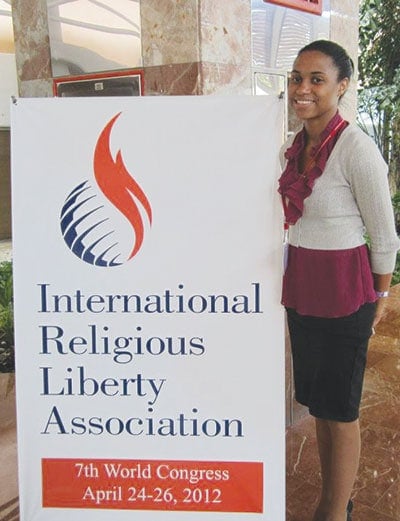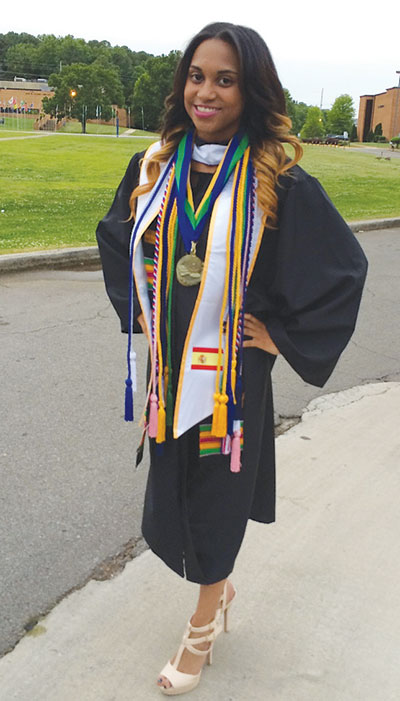
Blayre Brown started the first student religious liberty college chapter at Oakwood University, in Huntsville, Alabama, during her senior year. Brown shares with Anna Bartlett, a 2014 Adventist Review summer intern, the story of how she discovered her calling.
What sparked your interest in religious liberty?
My older brother had a book titled Foxe: Voices of the Martyrs. When I was about 7 years old, I went into his room, and I found the book. I began to read stories about people who had died because of religious persecution. I was touched by their stories.What touched me the most was the fact that people were persecuted for their beliefs and I didn’t think it was right. I felt that people should have the freedom to believe what they want to believe as long as their beliefs don’t hurt others.
When did you really get inspired to make a difference?
I watched a movie about Joan of Arc when I was 14 years old. I was fascinated by the fact that she was willing to be burned at the stake in order to bring freedom to others. It touched me to my core, and I thought, I want to be courageous like her. I wanted to be a woman who stood up for what was right even when it wasn’t popular.
 FREEDOM: Blayre Brown attended the 2012 International Religious Liberty Association World Congress in Punta Cana, Dominican Republic, where she discovered her calling to help religious minorities have a voice." class="img-right" style="float: right;">
FREEDOM: Blayre Brown attended the 2012 International Religious Liberty Association World Congress in Punta Cana, Dominican Republic, where she discovered her calling to help religious minorities have a voice." class="img-right" style="float: right;">
When did you get an opportunity to put your passion in action?
I had to write an essay, when I was in college, on the topic of my choice. I chose to write about the religious persecution of women in Saudi Arabia. I read about one girl who went to school but forgot her head covering and was given 20 lashes for not being covered. Stories like these reminded me that persecution is real. From there God helped me become an intern for the North American Religious Liberty Association (NARLA), located at the General Conference of the Seventh-day Adventist Church’s building.
Explain NARLA and its purpose.
NARLA is the Seventh-day Adventist Church’s member-driven organization dedicated to promoting liberty of conscience and freedom of religion, and combating religious intolerance at the local, state, and national levels. NARLA’s Web site shares that the mission of NARLA is to champion the God-given principle of religious liberty through public education, media, legal services, legislative advocacy, and grassroots mobilization.*
I find it fascinating that you attended the International Religious Liberty Association World Congress before you were a NARLA intern. What did you learn there?
Prior to starting the internship, I had the opportunity to go to Punta Cana, Dominican Republic, for the 2012 International Religious Liberty Association World Congress. The biggest shock for me was that religious persecution is very real. I knew it was real, but I never considered that it is actually affecting people every single day of their lives and that they have to fight just to be able to worship in their homes. That made a huge impact on my life. When I was younger, I thought careers working to help other people were not for me, but being at that congress made me realize that God wants me to work with His people to help them have a voice.
How did you get the internship with NARLA?
When I was 19, I shadowed some attorneys at the General Conference. During lunch one of the attorneys, Dwayne Leslie, told me the Public Affairs and Religious Liberty Department offered an internship for students interested in religious liberty. I applied and was accepted.
Describe your internship.
I had many roles as an intern. One was to research international religious liberty violations and inform my boss about the severity of the violation. I was on the Global Faith and Freedom television show, got to lobby a few bills, draft letters to religious and political leaders, and meet ambassadors and international religious liberty leaders at our religious liberty dinners.
One of the biggest projects I worked on was to help draft a letter to the Portuguese government describing religious accommodation in the workplace here in America. About a year later we found out that the Portuguese government received the letter favorably, and it helped two Seventh-day Adventists get religious accommodation at their jobs in Portugal. That was life-changing for me.
Interning with NARLA taught me perseverance, patience, and the importance of raising awareness. Religious liberty issues are not changed overnight, but if you speak up and you work on them, you can effect change.
How did you start a NARLA chapter at Oakwood University?
First, I talked to Melissa Reid, executive director of NARLA. She gave me the basic steps of registering with NARLA, getting a chapter name, and getting a following. Then I visited Oakwood’s Web site and went through the steps of starting a campus organization and finding a sponsor. It was really important to me to have a bilingual club so we could reach as many people as possible, so I prayed a lot about finding a supportive sponsor and executive team. We became registered on campus, attended the campus club fair, and had about 20 members our first year.
 MOVING ON: Blayre Brown graduated magna cum laude from Oakwood University with a degree in English and a minor in Spanish in May 2014. She is now studying law at Northwestern University in Evanston, Illinois." style="float: left;" class="img-left">
MOVING ON: Blayre Brown graduated magna cum laude from Oakwood University with a degree in English and a minor in Spanish in May 2014. She is now studying law at Northwestern University in Evanston, Illinois." style="float: left;" class="img-left">
What goals did you have for the Oakwood NARLA chapter?
My basic goal was to bring awareness of religious persecution to the student body and community members. We did this by holding a Religious Liberty Day event demonstrating the basic need for religious freedom, and through community partnership meetings and club activities designed to raise awareness of global issues.
Share your proudest moment as the NARLA chapter president.
Our biggest event was our Religious Liberty Day, a Sabbath school and evening program held in the Spanish church at Oakwood University. For Sabbath school we shared a skit illustrating religious persecution with kids involved to show that this affects all age groups. We then showed a short video in Spanish with English subtitles that highlighted young people being persecuted in their countries.
For the evening program we had a collection of campus musicians come and each perform a piece of music. In between pieces I shared about a country facing religious persecution and the difference our prayers and action can make.
How do you see student chapters making a difference?
Student chapters are diverse, and their energy level is very high. They are able to go to different politicians and talk to them about making change. In a group of people you can probably reach about 15 states and I think that holds great potential—you never know how far a little bit of encouragement or education can go if you share with your senators and congresspersons about religious liberty.
What are your hopes for the Oakwood chapter as it continues forward without you?
My biggest hope is that the student chapter is able to go out into the community and lobby. I would like to see the club use the power that it has to encourage congressmen and congresswomen to pass bills in favor of religious liberty. That would make my heart so happy.
What advice would you give to others who are interested in starting a NARLA chapter at their college?
I would tell them to talk to Melissa Reid [at NAD/PARL], find a great mentor, and realize that there is no time like the present. The more time you waste trying to figure out if you are able to do something, the more people’s lives are being lost. So go for it. Use your youth and residency to help be the change that you want to see in the world.
What are your plans for the future?
I am studying law at Northwestern University in Evanston, Illinois. In the future I would like to be a voice for the silent and help advocate on behalf of religious minorities who are being persecuted on a large scale. I believe in being the change that I want to see in the world. I want to help other countries realize that we can all be better.
* “About NARLA,” http://religiousliberty.info/about-narla, accessed Nov. 3, 2014.